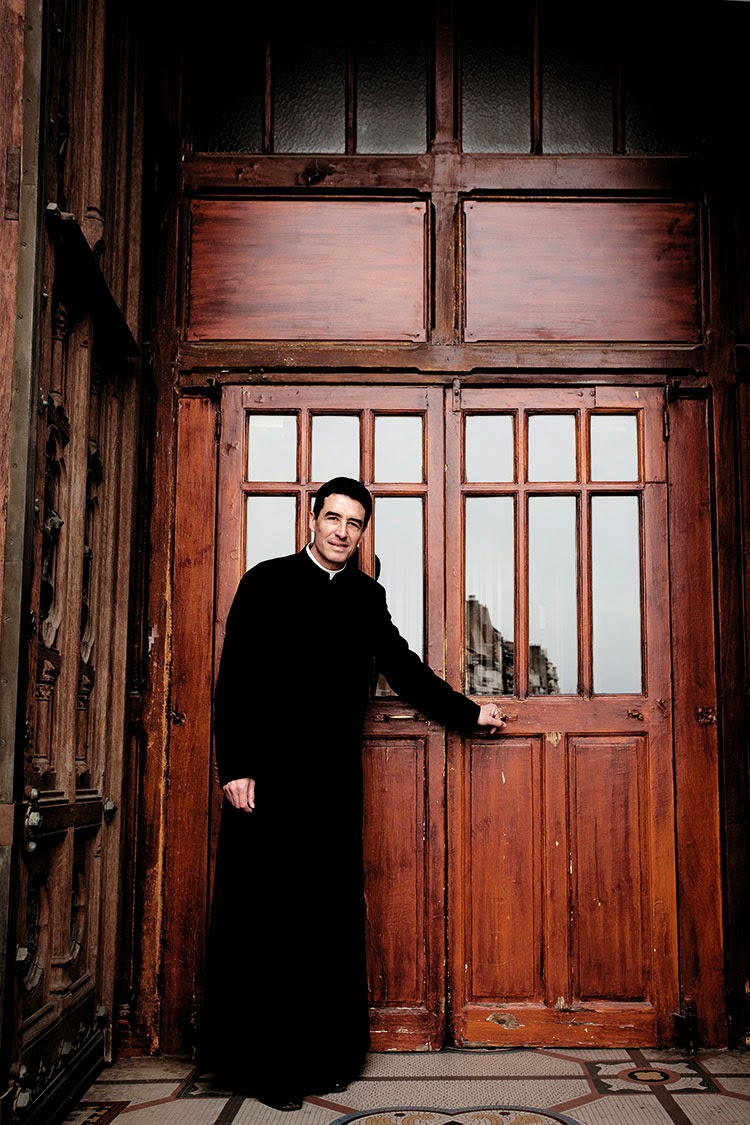--St. Teresa of Avila
Humor is essential for growth in the spiritual life. It is therapeutic and refreshing, lifting the weight of our cares. In fact, abiding humor is a sign of a healthy soul. But it isn't just any form of humor, for even the demons laugh and find some refreshment in their jokes and gags. The humor of demons' springs from malice and pride--their jokes always point back to their own prowess or cleverness, and what they find easy to despise (namely, us). As Christians, it should be expected that our sources of humor run in the opposite direction: not in pride, but in our littleness and dependence on God; not in our own craft, but in welcoming the providential surprises of God; not in despising the follies of his "poor banished children of Eve", but in a gently pitying mirth.
In the past several decades we have all heard laymen and religious reject talk of sin, the devil and spiritual warfare as gloomy and destructive of joy, but they have it exactly wrong. In fact, it is only through a sober understanding of sin that we are freed for the joyful fruits of humility, and it it only by living each day in spiritual combat that we can laugh at our topsy-turvy world. An abiding sense of our sin and weakness is not a psychological or spiritual handicap, it is actually a great grace from God! Once we recognize our dependence on God's mercy and our need for angelic aid, then we will have the ability to laugh at ourselves and our circumstances.
There have been many amusing moments as I walk the streets and many of those moments point back to my own weakness and foolishness. I think, for example, of the first time I walked the streets in my freshly sewn tunic. A powerful wind repeatedly blew the front 'yoke' of my tunic with the Jesus Caritas heart right back into my face. I'm sure the demons had a good laugh and I conceded it was funny since I had set out with such a solemn sense of purpose, a hidden belief in my own importance. On another occasion a woman who knew how to party (what some people call a 'barfly') saw me coming and stepped out in front of me to block my path. She straddled the sidewalk in her faded jean shorts, and firmly planted her hands against the pink tank top at her hips. I looked into her wrinkled tan face, at the black eye-liner and sparkling lip gloss, and watched her erupt in hoarse laughter as she reached out and poked at my tunic. I immediately joined her laughter. She was right: I looked like a fool, like a wayward time-traveller walking the streets. If a Christian can't laugh--especially at himself--then he is finished. He will collapse under the weight of his own seriousness and the gravity of the times. He will collapse because he has secretly placed himself at the center of things rather than trusting that Christ has overcome the world.
 |
| St. Therese having some fun as Joan of Arc |
The other day I was gripped by the seeming absurdity, the utter implausibility, of the traditional Catholic worldview. In the age of microscopes that can peer at "invisible" organisms, and telescopes that can examine distant solar systems, who can still maintain a belief in invisible spirits--both holy and wicked? Who can believe that all of our good and wicked actions will reverberate into eternity? Where is this all-powerful, all-knowing, all-loving God with his Kingdom of Heaven and barren desert of Hell? Hasn't science, the ingenuity and industry of man, uncovered everything and finally rendered life safe and predictable? Mankind no longer has to cower in caves, fearful of the creatures in the forest, mysterious diseases and the wrath of the gods. Civilization has finally won! Or so it seems.
But all is not what it seems, and the faithful Christian needs a healthy sense of humor about these things. When I walk the streets and a wounded, self-righteous person glowers at me as though I am his enemy, I laugh inwardly because he has it exactly wrong. It is a moment of absurdity. So often I want to say, "But I am the best friend you've got! I will pray and sacrifice for you, and I want nothing in return. But those whom you call your "friends", what do they want from you?"
We must have humility, humor and gratitude because the scales have fallen from our eyes, and what God has kept from the learned and powerful, he has revealed to the little ones. It is a great grace and a great responsibility. May we have the good humor to continue undisturbed along the Lord's path.







